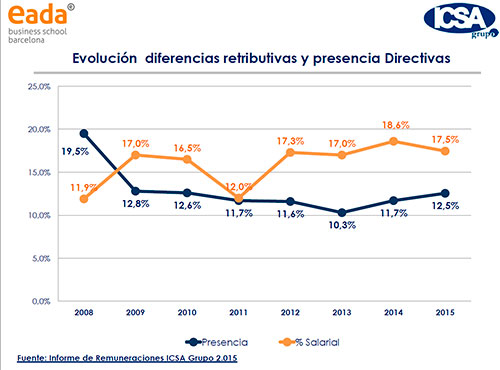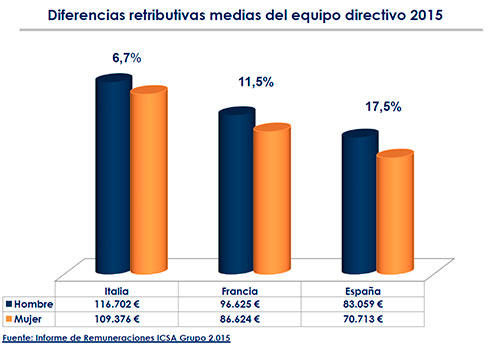Earnings differences between genders
Women’s presence in management posts has managed to pick up slightly
- The lukewarm economic recovery has opened up some hope for equality: Since 2013 the salary gap has decreased one percentage point and the presence of women managers has increased by 2%
- Male managers earn 17.5% more than their female colleagues
Barcelona, March 10th, 2015. Women hold 12.5% of management posts in Spain, which entails an increase of almost 2% on the 10.3% figure for 2013, which marked the end of a sustained drop since 2008, when women accounted for 20% of managers. The salary gap has shrunk by over one percentage point compared to 2014, which opens the door to hope as far as equality is concerned. In absolute figures, the current average gross earnings of a male manager are 83,000 euros per annum whereas those of his female counterpart are 71,713. These figures are taken from the 9th annual report on Earnings differences between genders presented today by ICSA Grupo and EADA Business School. The study was carried out using a sample that compiles salary data for over 80,000 people who work as employees in Spain, gathered through surveys and IT platforms such as www.cuantomepagan.com
As we can see in the graph there is a combination, a perverse equation which has held true over the years, according to which the economic crisis has led to fewer women managers and greater inequality in earnings. The slight recovery allows us to discern the first signs of a change in trend in this respect.

In the rest of professional categories the difference in earnings between the sexes has remained on similar levels to those of previous years: 14.2% in intermediate posts (37,683 € as opposed to 32,988) 11.2% in employees (23,138 € versus 20,811). As regards the presence of women, women hold 24.7% of intermediate posts and they represent 41.3% of the total number of employees in the country.
According to Ernesto Poveda, president of ICSA Grupo and director of the report, the report data confirms that among the working population women have lost out the most due to the crisis, although he does view the slight increase in the number of women in management posts as a positive trend. “It is the second year in a row” he points out “and I believe that we are witnessing a change in trend. The crisis has constituted an exceptionally harsh scenario for women but the recovery, if there is one, as certain bodies are indicating, could mean a greater share in the presence of women”.
As far as Dr. Aline Masuda, EADA professor and collaborator on the report, sees it, the results are very closely linked to the economic situation “which led to the resurgence of conservative and more masculine management models; we went back to ‘control’, to rigidity, to total availability. In such an environment women stand to lose out because they attach more value to other aspects such as conciliation and flexibility”. Masuda considers it a mistake to hang on to outdated models when today’s most successful companies base their work philosophy on aspects such as flexibility and creativity, steering away from rigidity and control. Furthermore, she considers that more equality should not depend on an economic recovery but “on a change in the way companies are conceived and managed”.
Our neighbours: France and Italy
As in previous editions, the salary report analyses earnings differences with our neighbours France and Italy. In absolute figures, Spanish women managers are the worst paid and the differences with their male colleagues are greater.

